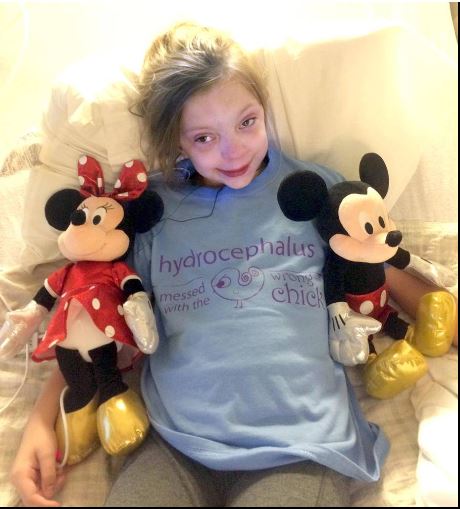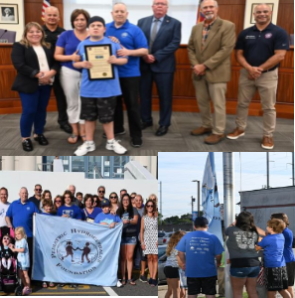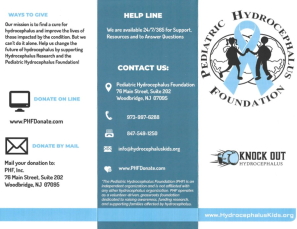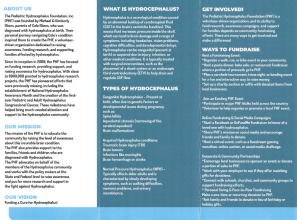MARSHALL: Doctor’s Note Jan. 12: 5 yr.-old raising awareness for Hydrocephalus
January 13, 2019 by PHF
Filed under Uncategorized
Comments Off on MARSHALL: Doctor’s Note Jan. 12: 5 yr.-old raising awareness for Hydrocephalus
By Congressman Roger Marshall
This week Caleb Wiggs from Leoti, Kansas celebrated his fifth birthday.
Caleb is grateful for many things this milestone, but perhaps one thing that many 5-year-olds overlook, he is grateful for his life. At the age of five, this condition has caused him to undergo three life-saving brain surgeries.
Caleb has been selected as one of the 2019 National Ambassador for Hydrocephalus Awareness for the Pediatric Hydrocephalus Foundation. As an ambassador, he will educate people across the country on this disease that so desperately needs medical advancements and treatment solutions. He will also participate in the 2019 Hydrocephalus Issues & Action Conference in Washington this August where he will meet with my fellow lawmakers.
Hydrocephalus can develop at the time of birth or later. As an obstetrician, I understand the severity of this condition from having to prepare new mothers for the challenges ahead and ensuring the best care for these newborns. Sadly, one to two of every 1,000 babies are born with hydrocephalus but there is hope. Robust medical research partnered with patient advocates like Caleb can bring new advancements to the finish line.
Caleb, your bravery and voice will have an impact on thousands of lives, including the many families fighting this condition.
PHF In The News: Local girl heads to nation’s capitol
August 22, 2016 by PHF
Filed under Uncategorized
Comments Off on PHF In The News: Local girl heads to nation’s capitol

TOWN OF VERNON — This Friday, 7-year-old Westmoreland Elementary student Elyse Clough plans to address Congress, hoping to educate lawmakers on hydrocephalus and to seek their help in fighting it.
Elyse and her family left this morning for Washington, DC despite her emergency surgery last Saturday.
“She made it through, and she’s a real fighter,” Elyse’s father, Tom Clough, said. “And now we’re definitely heading out to speak on hydrocephalus.”
Elyse, who aspires to be a pediatrician, has been named National Ambassador of Hydrocephalus Awareness for 2016 by the Pediatric Hydrocephalus Foundation. On Friday she will join her parents and 23 other members of Research, Educate, and Cure Hydrocephalus, a DeWitt-based support group, to advocate for hydrocephalus research.
Hydrocephalus is a medical condition caused when an excess of fluid causes swelling and pressure on the brain. It has no known cure, and the only treatment is a shunt implant. A shunt is a soft silicone implant placed in the brain, then directed under the skin to the abdomen where excess fluid is drained and re-absorbed into the body.
Elyse received her seventh shunt after a seizure Friday evening.
“I was saying good night to my son, and as I passed her room I saw her hand shaking. I knew she was having a seizure, and we drove to Upstate University Hosptal (in Syracuse). We stayed there until Sunday afternoon,” Elyse’s father, Tom, said.
Elyse suffered the seizure at 10:30 that evening, and she underwent surgery 8:25 a.m. Saturday morning. After doctors confirmed the shunt was not infected and that Elyse was healthy she was released and sent home.
“The doctors ran some tests to be sure she is eating and drinking, that her eyes are clear and she is walking and using the bathroom,” Tom Clough said. “Because of the number of sick people in a hospital the risk of infection is lower at our home.”
On Friday morning Tyler Side, 11, of Washington state, will join her to represent boys battling hydrocephalus. They will then make a number of public and social media appearances during September, which PHF has designated as National Hydrocephalus Awareness Month.
But first she will enjoy some time visiting Washington and Virginia Beach.
“I am ready to stand before the people in suits and talk,” Elyse said. “Then I will go to the beach with my pail and shovel and play.”
Request for help
Elyse and other members of the delegation will stand before the country’s legislative branch to help advocate for continued education and research for her condition. Their goal is to have Bill H.R. 2313 passed into law.
If passed the Public Health Services Act would require the Centers for Disease Control and Prevention to expand its tracking of the epidemiology — the patterns, causes and effects — of hydrocephalus and use the information as part of a national database to spur research on the condition.
“We hope to accomplish more than we did last year,” Elyse’s mother, Kim Clough, said. “We’ve had good success with (U.S. Senator Charles) Schumer’s office, but we need to get this passed in the House of Representatives first before the Senate will consider it. We met with a representative’s staffer and all he did was stare at his pen and ignore what we said.”
An ongoing battle
PHF, which has chapters in 30 states, provides supports to families and also advocates with the medical and legal communities to help find a cure. Since 2010 they have given $375,000 in grants and donations towards research and education on the condition.
Research is needed because the relief provided by shunts is compromised by their frequent failure rate. Children have a shunt failure rate between 25 and 40 percent. Replacing a shunt is a complicated and potentially dangerous process. Elyse most recently had a shunt replaced in February.
“There are 40,000 shunt replacements a year, one every 15 minutes,” Tom Clough said.
Endoscopic third ventriculostomy, a shunt-free procedure where an incision at the bottom of enlarged ventricles allows fluid to drain, only works in two-thirds of patients.
Despite its myriad disorders hydrocephalus has a high survival rate. Several of the estimated 125,000 people suffering from have reached middle-age and older. “Some of these people will be coming with us this week,” Tom Clough said.
The Clough family remains proactive in supporting Elyse. Older brother Nathan supports his sister in school, and saves his allowance to help fund a cure. Tom Clough has organized the second fun run to raise money for Elyse. Information on the run and REACH’s mission may be found at www.reachorg.org
Hydrocephalus has over 180 different causes. They include birth defects, traumatic brain injury, infection, and overproduction or under-absorption of brain fluid. Symptoms include headaches, nausea and vomiting and sensitivity to light and flu-like pains. Elyse developed hydrocephalus after she was born premature, at 24 weeks.
Along with the risk of seizure, Elyse takes medication for her underdeveloped lungs (caused by her premature birth) and undergoes physical therapy, occupational therapy and speech therapy. She has trouble feeding herself anything besides finger foods. And she’s endured six shunt operations.
“This child could take up all of our time, but it is what it is,” Kim Clough said. “We know there has to be a better solution. If we can get political help then we will be closer to that solution.”
 Read more at: https://html.com/attributes/img-width/>
Read more at: https://html.com/attributes/img-width/>





























